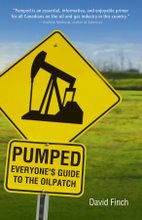The Alberta government's Royalty Review Panel passed through Calgary last week and got several earsful of comments about what should be done about the income the people of Alberta get from oil and gas.
Individuals, companies and associations made good points, but each perspective was also short-sighted and preoccupied with a narrow agenda - making money for one just one group.
Sixty years ago drillers discovered a new oilfield at Leduc and today its all over - the oil and gas is gone.
Where do we want to be sixty years from now? Will new technology have replaced oil and gas, coal and hydro? Not likely.
But we know the easy work is in the past. New sources of oil and gas are harder to find, more expensive to produce and demand a much higher price at the pump.
Let's take the long view, for a change. We need leadership at all levels - in industry, all levels of government, and in social groups too.
Albertans want plans that are sustainable, encourage innovative technologies, that are environmentally responsible and that show us to be careful stewards of our wonderful birthright.
Prosperity, stability and predictability - these were all requested at the Royalty Review Panel. Let's all think about the big picture, not just our individual interests, and find innovative new ways to share the wealth and assure our future.
Tuesday, May 29, 2007
Tuesday, May 15, 2007
Gas Price Jumps - A New Theory
An opossum "caused a power failure" after getting into an electrical substation recently and brought down an Exxon Mobil refinery in California...
Prices at the pump are now higher than after the Katrina hurricane shut down several refineries in the southern United States.
Conspiracy theories abound, again, and governments are once again under pressure to hold inquries into the outrageous profits being made by petroleum companies.
But the real reason pump prices go up is simple - people are willing to pay the price.
Good consumers shop around for the best price, change their consumption habits, reduce their reliance on one product and get on with life.
See "Outrageous: The Price at the Pump" in Pumped: Everyone's Guide to the Oil Patch coming this summer for more details on how you can reduce your "pump shock" when you fill up with gasoline.
Common sense prevails when we buy meat, bread and vegetables - why not when it comes to gasoline? There are lots of ways to save on transportation costs.
Watch out for opossums or possums, same thing - rabbits and gophers too.
Prices at the pump are now higher than after the Katrina hurricane shut down several refineries in the southern United States.
Conspiracy theories abound, again, and governments are once again under pressure to hold inquries into the outrageous profits being made by petroleum companies.
But the real reason pump prices go up is simple - people are willing to pay the price.
Good consumers shop around for the best price, change their consumption habits, reduce their reliance on one product and get on with life.
See "Outrageous: The Price at the Pump" in Pumped: Everyone's Guide to the Oil Patch coming this summer for more details on how you can reduce your "pump shock" when you fill up with gasoline.
Common sense prevails when we buy meat, bread and vegetables - why not when it comes to gasoline? There are lots of ways to save on transportation costs.
Watch out for opossums or possums, same thing - rabbits and gophers too.
Labels:
conspiracy theories,
consumers,
hurricanes,
opossum,
prices
Wednesday, May 2, 2007
Leduc - Life and Death of an Oilfield
Canadians gobble up oil and gas resources 100,000 times faster than nature creates them. That's why the story of a massive oilfield like the one discovered in 1947 near Leduc, Alberta is so important.
Imperial Oil drilled a discovery well and more than 1000 wells followed. Alberta went from a poor province to one of Canada's wealthiest in just a decade.
Pipelines built during the 1950s and 1960s transported oil and gas to central Canada and the mid-western United States as well as to British Columbia and California.
But by the 60th anniversary of the discovery of oil at Leduc, in 2007, it was all over. Leduc's productive days are done.
At its peak Leduc produced over a million barrels of oil each day - as much as is coming out of the oil sands today.
Leduc made Alberta rich and allowed it to become a powerful province in the dominion of Canada. Hospitals, roads, bridges, universities, skating rinks and swimming pools all came from its generosity.
Today, conventional oil is in decline in Alberta so producers are now counting on on smaller pools of oil and gas, coal bed methane and the oil sands to keep them in business. And they're looking elsewhere in Canada and overseas for more supplies.
Petroleum production from the North may one day become an important part of the Canadian supplies and Alberta is perfectly situated to help build the infrastructure to move oil and gas from remote areas to continental markets.
The days of easy wealth are behind us.
Imperial Oil drilled a discovery well and more than 1000 wells followed. Alberta went from a poor province to one of Canada's wealthiest in just a decade.
Pipelines built during the 1950s and 1960s transported oil and gas to central Canada and the mid-western United States as well as to British Columbia and California.
But by the 60th anniversary of the discovery of oil at Leduc, in 2007, it was all over. Leduc's productive days are done.
At its peak Leduc produced over a million barrels of oil each day - as much as is coming out of the oil sands today.
Leduc made Alberta rich and allowed it to become a powerful province in the dominion of Canada. Hospitals, roads, bridges, universities, skating rinks and swimming pools all came from its generosity.
Today, conventional oil is in decline in Alberta so producers are now counting on on smaller pools of oil and gas, coal bed methane and the oil sands to keep them in business. And they're looking elsewhere in Canada and overseas for more supplies.
Petroleum production from the North may one day become an important part of the Canadian supplies and Alberta is perfectly situated to help build the infrastructure to move oil and gas from remote areas to continental markets.
The days of easy wealth are behind us.
Tuesday, May 1, 2007
This October, 2007, Fifth House will publish
Pumped: Everyone's Guide to the Oilpatch
by David Finch
A witty, straight-from-the-hip guide to Canada's booming oil industry.
Seasoned petroleum historian David Finch engages and entertains as he acquaints us with the basic vocabulary and mechanics of Canada’s oil industry right through its most complex issues. Perhaps you know the answers to some of the basics: What is a barrel of oil? Where does it come from? How does it get into the gas tank? Why is oil so political? Do you recall the details of some of the programs? What was the National Energy Program, The National Oil Program, the Western Accord, and why did they matter? Are you well-versed enough in the politics to know the answers to these questions? Are we really running out of oil? What is the current state of the tar sands? What do “upstream,” “midstream,” and “downstream” mean? Who controls oil and gas in Canada and why does it cost so much if it belongs to us, the people of Canada? And finally, “Why does this industry dominate the world's economic and political arenas.”
With short chapters, illustrations, maps, photographs, and a user-friendly index-glossary, Pumped makes the complicated, jargon-rich, high-stakes world of petroleum exploration, excavation, and consumption easy to understand.
Finch provides a balanced, knowledgeable, and often-humorous primer on the mechanics, history, and politics of Canada’s oil industry.
Books will be available from Fitzhenry & Whiteside. Get your order in now - or contact Lyn Cadence at promotions@fifthhousepublishers.ca to invite David Finch to interpret the oil industry for your audience.
Pumped
978-1-897252-09-3
6 x 9, 224 pages, 40 photos, maps, illustrations, index, glossary/index
$22.99 pb
October publication
BUS070040 / BUSINESS & ECONOMICS / Industries / Energy Industries
TEC047000 / TECHNOLOGY / Petroleum
Pumped: Everyone's Guide to the Oilpatch
by David Finch
A witty, straight-from-the-hip guide to Canada's booming oil industry.
Seasoned petroleum historian David Finch engages and entertains as he acquaints us with the basic vocabulary and mechanics of Canada’s oil industry right through its most complex issues. Perhaps you know the answers to some of the basics: What is a barrel of oil? Where does it come from? How does it get into the gas tank? Why is oil so political? Do you recall the details of some of the programs? What was the National Energy Program, The National Oil Program, the Western Accord, and why did they matter? Are you well-versed enough in the politics to know the answers to these questions? Are we really running out of oil? What is the current state of the tar sands? What do “upstream,” “midstream,” and “downstream” mean? Who controls oil and gas in Canada and why does it cost so much if it belongs to us, the people of Canada? And finally, “Why does this industry dominate the world's economic and political arenas.”
With short chapters, illustrations, maps, photographs, and a user-friendly index-glossary, Pumped makes the complicated, jargon-rich, high-stakes world of petroleum exploration, excavation, and consumption easy to understand.
Finch provides a balanced, knowledgeable, and often-humorous primer on the mechanics, history, and politics of Canada’s oil industry.
Books will be available from Fitzhenry & Whiteside. Get your order in now - or contact Lyn Cadence at promotions@fifthhousepublishers.ca to invite David Finch to interpret the oil industry for your audience.
Pumped
978-1-897252-09-3
6 x 9, 224 pages, 40 photos, maps, illustrations, index, glossary/index
$22.99 pb
October publication
BUS070040 / BUSINESS & ECONOMICS / Industries / Energy Industries
TEC047000 / TECHNOLOGY / Petroleum
Subscribe to:
Comments (Atom)

